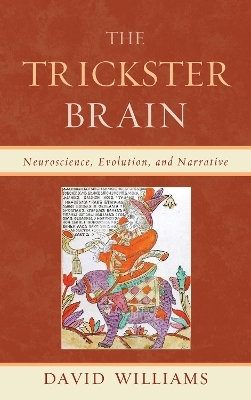
The Trickster Brain
Lexington Books (Verlag)
978-0-7391-8832-3 (ISBN)
Williams brings together science and the humanities, demonstrating a critical way of approaching literature that incorporates scientific thought.
David Williams, PhD, has been a writer-in-residence at a number of universities and colleges, including Knox College and the Metropolitan State College of Denver. He is also an Emmy winning songwriter, cartoonist, and string musician with many CDs to his credit. Currently, he teaches in the Writing Program at the University of Colorado Boulder.
Introduction
Chapter 1: Searching for Trickster
Chapter 2: The Silver Tongued Devil
Archetypes
Where is Science in the Study of Literature?
Universal Human Nature
Textual Authority vs. Empirical Evidence
How Did Language Begin?
Chomsky
Schema Theory
Chapter 3: The Tricksterish Brain
Chapter 4: Evolution
Chapter 5: The Brain of Sex
Sex, Disease, and Competition
Displays
The Sexiest Animals
Ornamental Mind
Chapter 6: The Brain of Love and War
Sexual Selection and Altruism
Monogamy?
Women and War
Civilization and Enslavement of Women
Why Love?
The Power of Love: Women’s Songs of Love from Afghanistan
Chapter 7: The Brain of Song
Music and Language—Common Roots
Two Camps
Why Did Music and Language Split?
Music and Food
Sexual Selection for Music
Tribal Songs for Every Aspect of Life
Chapter 8: Ethics
The Falacy of the Naturalistic Fallacy: Is—Ought
Fairness and Justice in the Animal World
Chapter 9: Storytelling and the Theory of Mind
Unconsciousness & Consciousness
Theory of Mind
Chapter 10: The Brain of God
Potheism/Monotheism and the Search for Meaning
Why God?
What Caused Religion?
Origins of Religion
Other Explanations
Chapter 11: The Trickster of Mythology
Why Trickster?
Trickster Biological Origins
Chapter 12: A Swath of Trickster Stories from Oral Literature
Sex, Desire, and the Body
Some Trickster Stories from Around the World
Coyote Marries a Man (Plains Cree, North America)
A Contest for Wives (Cochiti, North America)
Legba (Fon, West Africa)
Coyote Visits the Women (Assiniboine, North America)
Coyote and His Anus (Nez Perce, North America)
The Trickster Myth (Winnebago, North America) excerpts
Uncle Tompa (Tibet)
Namaranganin (Aborigine, Australia)
Coyote Sleeps with His Own Daughters (Southern Ute, North America)
How Kwaku Ananse Got Aso in Marriage (Ashanti, Africa)
Coyote Keeps his Dead Wife’s Genitals (Lipan Apache, North America)
Chapter 13: Female Tricksters
Evil Woman Trickster Stories
The Toothed Vagina (Yurok, North America)
Teeth in the Wrong Place (Ponca-Otoe, North America)
The Witch Wife (Colombia)
Proverbs 5, 3-8 (Hebrew)
Clever/Good Women Trickster Stories
Old Man Coyote Meets Coyote Woman (Blackfoot, North America)
The Most Precious Thing in the World (Hebrew)
The Clever Daughter-in-Law (Kanda, India)
The Wife who Refused to be Beaten (Kashmiri, India)
One More Use for Artists (Gujerti, India)
The Faithful Wife and the Woman Warrior (Tiwa, North America) A Pueblo
tale featuring Apache characters
Iktome Sleeps with His Wife by Mistake (Brule Sioux, North America)
Chapter 14: Literary Filters
Chapter 15: Music and the Trickster
Literary Filters
Music and the Trickster
Singing the World Into Being: Creation Stories with Song
Apache Creation Story (North America)
Creation Story (Hopi, North America)
Bunjil The Creator #1 (Aboriginal, Australian)
Diné (or Navajo) (North America)
Mythic Trickster Musicians and Singers
Ajapa and the Roasted-Peanut Seller (Yoruba, Africa)
Coyote Giving (Paiute, North America)
Hermes (Greek)
Hanuman (India)
The Zande Trickster, Tule; The Bushman (Africa)
Chapter 16: A Swath of Other Trickster Stories from Around the World
The Wonderful Tar Baby Story (African American)
John (African American)
How the Wicked Tanuki was Punished (Japan)
Fox and Snake—Good is Repaid with Evil (Venezuela)
Sun Wu-K’Ung, The Monkey King (China)
Dionysus (Greek)
The Wanderings of Dionysus (Greek)
Prometheus (Greek)
Pandora (Greek)
Orpheus (Greek)
Coyote and the Shadow People (Nez Perce, America)
The Infancy Gospel of Thomas (Apocrophy Gospel, 2nd century)
Jesus Child (Quichua, Ecuador)
Jesus Christ (Cakchiquel Maya (Guatemala)/ Matias Sicajan)
We-Gyet (‘Ksan, Northwest Coast)
Chapter 17: The Trickster Personified
The Heyoka Ceremony
Buddhist Clowns
Jewish and Christian Clowns
Other Clowns
Islamic Clown
Jesters
Kannada; Tamil; Telugu (India)
How Tamali Rama Became A Jester (India)
Tamali Rama Recites Story of Ramayna (India)
Tyll Ulenspiegel’s Merry Prank (Germany)
Quevedo and the King (Mexico)
Chapter 18: Blues & Courting Tricksters
Chapter 19: Trickster in Written Literature
Chapter 20: Trickster Was Wandering
| Erscheint lt. Verlag | 18.10.2013 |
|---|---|
| Verlagsort | Lanham, MD |
| Sprache | englisch |
| Maße | 154 x 229 mm |
| Gewicht | 476 g |
| Themenwelt | Literatur ► Anthologien |
| Geisteswissenschaften ► Psychologie ► Psychoanalyse / Tiefenpsychologie | |
| Geisteswissenschaften ► Psychologie ► Sexualität / Partnerschaft | |
| Geisteswissenschaften ► Psychologie ► Sozialpsychologie | |
| Medizin / Pharmazie ► Medizinische Fachgebiete ► Neurologie | |
| Naturwissenschaften ► Biologie ► Humanbiologie | |
| Naturwissenschaften ► Biologie ► Zoologie | |
| Sozialwissenschaften ► Soziologie | |
| ISBN-10 | 0-7391-8832-1 / 0739188321 |
| ISBN-13 | 978-0-7391-8832-3 / 9780739188323 |
| Zustand | Neuware |
| Haben Sie eine Frage zum Produkt? |
aus dem Bereich


